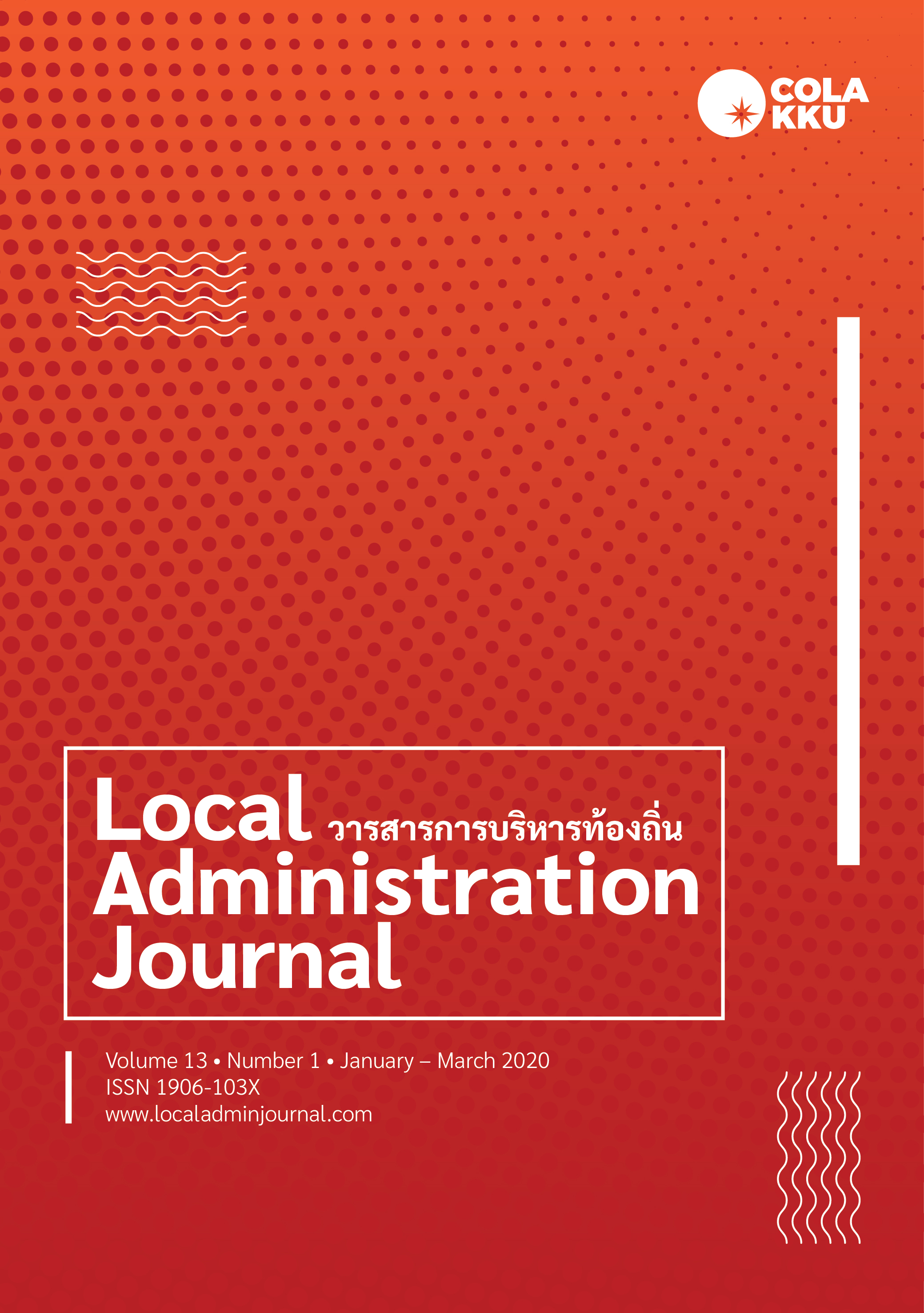An Analysis of the Readiness of Lampang Province for Community-Based Tourist Attraction Administration
Keywords:
Readiness, tourist attraction management, community based tourismAbstract
This article aimed to: 1) review the context of community tourist attractions; 2) explore the availability of community based tourism personnel; and 3) study factors that affect the development of tourism management potential by communities that lead to efficient planning tourism. The author examined the community based tourism in four communities in Lampang Province. The study found that the communities’ attractions are natural, cultural, and historical sites. The local identity is what attracts tourists to visit. Events and tourist routes are indicative of a lifestyle and culture that create outstanding social and cultural learning opportunities for tourists. In terms of management, community tourism committees are ready to work for the common goals, have transparent budget administration, share their benefits fairly, and provide facilities, services and security for tourists. In addition, community based tourism in Lampang has a potential to meet the community-based tourism management standard because the committees allocate revenues for further community development, promote tourism activities that do not affect the historic and spiritual sites of the community, set standards in waste management activities, and stipulate appropriate security measures for the communities.
References
ภาษาไทย
ฉลองศรี พิมลสมพงศ์. (2548). การวางแผนและพัฒนาตลาดการท่องเที่ยว. กรุงเทพฯ: สำนักพิมพ์มหาวิทยาลัยเกษตรศาสตร์
ญาณวุฒิ อภิวงศ์. (2554). แนวทางการพัฒนารูปแบบการท่องเที่ยวโดยชุมชนเพื่อประโยชน์ในการอนุรักษ์สิ่งแวดล้อมและสร้างผลประโยชน์ต่อคนในชุมชนของบ้านม้งดอยปุย ตำบลสุเทพ อำเภอเมือง จังหวัดเชียงใหม่. (วิทยานิพนธ์ศิลปศาสตร์มหาบัณฑิต, มหาวิทยาลัยเชียงใหม่).
ดรรชนี เอมพันธุ์. (2550). การพัฒนาการท่องเที่ยวโดยชุมชนและการจัดกิจกรรมโฮมสเตย์. กรุงเทพฯ: มหาวิทยาลัยเกษตรศาสตร์.
ประยงค์ บุญไทย. (2551). แนวทางประสานความร่วมมือระหว่างชุมชนท้องถิ่นและสถานประกอบการในการจัดการท่องเที่ยวโดยชุมชน ตำบลบ้านปง อำเภอหางดง จังหวัดเชียงใหม่ (รายงานวิจัย). เชียงใหม่:
(ม.ป.ท.)
พจนา สวนศรี. (2546). คู่มือการจัดการท่องเที่ยวโดยชุมชน. กรุงเทพฯ: โครงการท่องเที่ยวเพื่อชีวิตและธรรมชาติ
มิ่งสรรพ์ ขาวสะอาด. (2548). การพัฒนาการท่องเที่ยวเชิงบูรณาการที่ยั่งยืนในลุ่มแม่น้ำโขง. เชียงใหม่: สถาบันวิจัยสังคม มหาวิทยาลัยเชียงใหม่
รชพร จันทร์สว่าง. (2546). เอกสารชุดฝีกอบรมทางไกลหลักสูตรการจัดการท่องเที่ยวชุมชนอย่างยั่งยืน. สำนักงานพัฒนาการท่องเที่ยว กระทรวงการท่องเที่ยวและกีฬาร่วมกับมหาวิทยาลัยสุโขทัยธรรมาธิราช นนทบุรี
วิวัฒน์ชัย บุญยภักดิ์. (2550). ทรัพยากรการท่องเที่ยวของไทย. เอกสารการสอนชุดวิชาทรัพยากรการท่องเที่ยวของไทย สาขาวิชาวิทยาการจัดการ.นนทบุรี: มหาวิทยาลัยสุโขทัยธรรมาธิราช
สถาบันการท่องเที่ยวโดยชุมชน. (2551). การท่องเที่ยวโดยชุมชน. สืบค้นจาก https://www.cbt-i.org/travel.php
สินธุ์ สโรบล. (2546). การท่องเที่ยวโดยชุมชนแนวคิดและประสบการณ์พื้นที่ภาคเหนือ. เชียงใหม่: วนิดาเพลส.
Translated References
Aphiwong, Ch. (2011). Guidelines for the development of tourism by the community for the benefit
of the environment and conservation. Creating benefits for the community of Hmong Doi Pui Suthep, Chiang Mai. (Master’s thesis of Arts, Chiang Mai University). (In Thai)
Boonthai, P. (2008). A collaborative approach between the local community and the establishment
of tourism management by the community. Tambon Ban Pong, Amphoe Hang Dong,
Chiang Mai (Research Report). Chiang Mai: (n.p) (In Thai)
Boonyapat, V. (2007). Thailand's tourism resources. Thai Tourism Resource Collection Instruction Document Management Science. Nonthaburi: Sukhothai Thammathirat University. (In Thai)
Community Tourism Institute. (2008). Community tourism. Retrieved from https://www.cbt-i.org/travel.php (In Thai)
Emphan, D. (2007). Community Tourism Development and Homestay Activity Management. Bangkok:
Kasetsart University. (In Thai)
Junsawang, R. (2003). Documentary on distance training package for sustainable community tourism management course The training is a collection of long-distance documents for sustainable
Community tourism management courses. Ministry of Tourism and Sports. Office of Tourism Development in collaboration with Sukhothai Thammathirat University. Nonthaburi: Sukhothai Thammathirat University (In Thai)
Khowsaad, M. (2005). The integrated tourism development in the Mekong Basin. Chiang Mai:
Social Research Institute Chiang Mai University (In Thai)
Pimolsompong, C. (2005). Planning and Development of Tourism Market. Bangkok: Kasetsart
University (In Thai)
Sarobhon, S. (2003). Tourism by the community, concepts and experience of the northern area.
Chiangmai: Wanida Place. (In Thai)
Sounsri, P. (2003). Tourism Management Guide by the community. Bangkok: Tourism project for Life
and Nature. (In Thai)
Downloads
Published
How to Cite
Issue
Section
License
The copyright of all articles published in the Local Administration Journalis owned by the College of Local Administration, Khon Kaen University.


